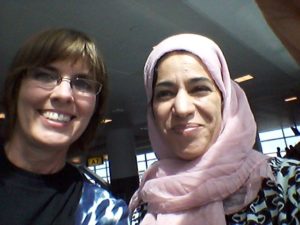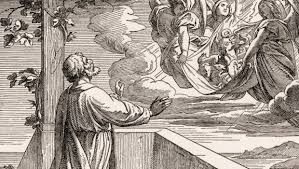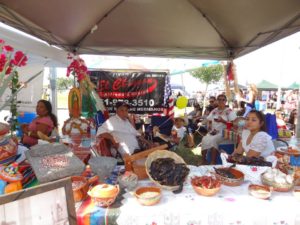I love it when a friend shares with me their own journey to reach out in friendship to our new neighbors from distant lands. Here is one such story I know you will enjoy – we’ve changed the names. (By the way, do you have a story to share? Email it to us.) Another #NearFrontierTREK.
Julie and Nabila were coworker’s, and became quite close over the years. Finally, the day came when Julie felt she should extend an invitation to Nabila and her husband, Ahmed, to come to dinner at her home.
Before sitting down to dinner Julie explained that she and her husband John give thanks before eating, so, “John will say a prayer.” After John finished praying Ahmed said, “That was really nice. I like that you pray before eating.” Julie said, “We have so many reasons to be grateful, so that’s why it’s important to give thanks.” They all agreed, even Ahmed and Nabila’s son nodded his head.
 During the course of the meal John and Julie asked how and where Ahmed and Nabila had met. They grew up in the same Middle Eastern city, and theirs was an arranged marriage. Although their families would get together on occasion, along with Ahmed’s and Nabila’s brothers and sisters, Ahmed and Nabila were never allowed to speak to each other because of their future marriage. We all fell off our chairs laughing when Nabila said, “Ahmed looked at me and said, ‘Good enough.'” Ahmed just smiled, but then he said, “We truly learned to love each other.”
During the course of the meal John and Julie asked how and where Ahmed and Nabila had met. They grew up in the same Middle Eastern city, and theirs was an arranged marriage. Although their families would get together on occasion, along with Ahmed’s and Nabila’s brothers and sisters, Ahmed and Nabila were never allowed to speak to each other because of their future marriage. We all fell off our chairs laughing when Nabila said, “Ahmed looked at me and said, ‘Good enough.'” Ahmed just smiled, but then he said, “We truly learned to love each other.”
Julie offered that John and she also had an arranged marriage. In surprised unison Ahmed and Nabila said, “You too?” John said, “No no no no,” but Julie continued. “Let me tell you our story. I was at church seated at a table, and had noticed a new man (John) sitting at the table across from me. As I listened to him talk I could tell that he had a deep love for God, and I began to pray, “God, please make it possible for me to meet this man.” And, after the service John came to talk to me. So that’s how God arranged our marriage.” And Ahmed and Nabila understood. Later on Nabila was talking about something and said, “…just like you prayed and God arranged your marriage….”
For a continuation of this relationship, click here.
Photo credit: cherebork.com



